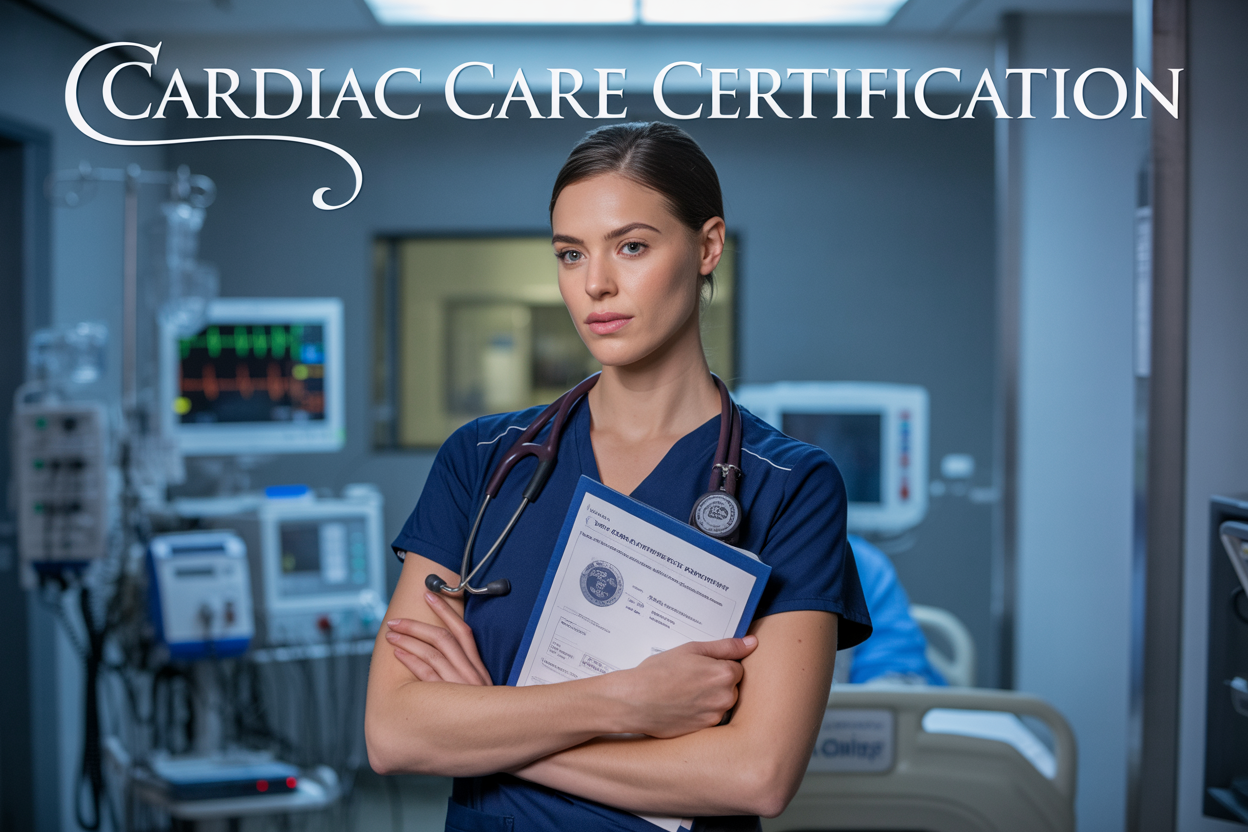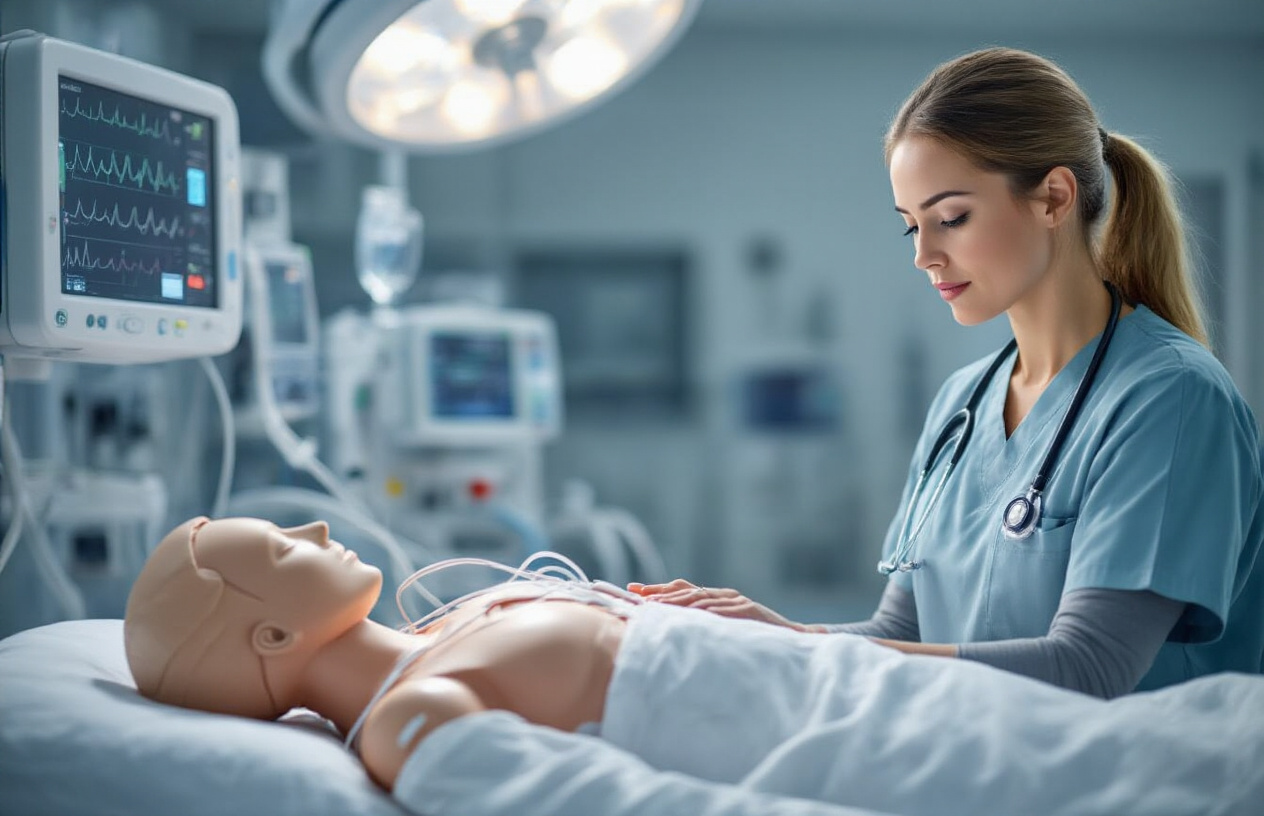
Cardiac Care Nurse Certification: Empowering Nurses to Save Hearts
Cardiac care nurse certification opens doors for registered nurses who want to specialize in heart health and make a real difference in patients’ lives. This advanced credential is perfect for RNs working in cardiac units, ICUs, or emergency departments who are ready to take their expertise to the next level.
Getting certified in cardiac care isn’t just about adding letters after your name—it’s about gaining the specialized skills and knowledge that can literally save lives. We’ll walk you through the certification requirements and what it takes to qualify for these programs. You’ll also discover how this credential can boost your career prospects, from higher salaries to leadership roles in top-tier cardiac programs. Plus, we’ll explore the specialized skills you’ll develop, from advanced cardiac monitoring to emergency interventions that make you an invaluable member of any heart care team.
Understanding Cardiac Care Nurse Certification Requirements

Essential educational prerequisites and clinical experience
Cardiac care nurse certification demands a solid foundation starting with an active RN license and typically two years of direct cardiovascular nursing experience. Most certification bodies require at least 2,000 hours of cardiac-focused clinical practice within the past three years. BSN degrees are increasingly preferred, though ADN graduates with substantial experience remain eligible. Critical care backgrounds in ICU, CCU, or cardiac catheterization labs provide ideal preparation for certification requirements.
Specialized training programs and coursework options
Multiple pathways exist for cardiac nursing education, including hospital-based orientation programs, university certificate courses, and online modules. The American Association of Critical-Care Nurses (AACN) offers comprehensive review courses covering cardiac anatomy, pathophysiology, pharmacology, and interventional procedures. Many healthcare systems provide mentorship programs pairing new cardiac nurses with experienced practitioners. Online platforms deliver flexible learning schedules for working professionals seeking certification preparation.
Examination preparation and testing procedures
The Cardiac Medicine Certification (CMC) and Progressive Care Certified (PCCN) exams test comprehensive cardiac knowledge through multiple-choice questions. Computer-based testing occurs year-round at authorized centers nationwide. Exam content covers cardiac assessment, diagnostic procedures, therapeutic interventions, and patient education. Practice tests, study guides, and review seminars help candidates prepare for the rigorous 150-question format with strict time limits and passing score requirements.
Continuing education and recertification mandates
Certified cardiac nurses must complete 100 continuing education hours every four years to maintain their credentials. At least 25 hours must focus specifically on cardiac care topics, while remaining hours can address general nursing competencies. Professional conferences, workshops, webinars, and journal articles provide approved learning opportunities. Recertification ensures nurses stay current with evolving cardiac treatments, technologies, and evidence-based practices that improve patient outcomes.
Boost Your Nursing Career with a Cardiac Care Nurse Certification
Step into the world of advanced cardiac care with the Cardiac Care Nurse Certification from Global A1 Institute of Paramedical Science. This online recorded course is perfect for nurses who want to specialize in heart care and work confidently in ICU or cardiology departments.
✅ Learn from Specialist Doctors – Our courses are taught by experienced doctors who share their real hospital experiences and practical insights.
✅ Fully Online, Recorded Lectures – Learn at your own pace through structured recorded sessions that you can revisit anytime for revision.
✅ Doubt-Solving Community – Get continuous support through our active online doubt community, where our faculty and peers help you clear concepts quickly.
✅ Affordable Fees with Monthly EMI Options – Advance your career without financial stress! We provide flexible EMI plans so you can learn first and pay easily over time.
✅ Lifetime Course Access – Revisit your course content anytime in the future to refresh your skills or stay updated.
✅ ISO-Certified Course & Recognized Certification – Get a credible certification that adds value to your resume and helps you stand out in the healthcare industry.
Specialized Skills Development for Heart Care Excellence

Advanced Cardiac Monitoring and Assessment Techniques
Cardiac care certification transforms nurses into skilled interpreters of complex heart rhythms and hemodynamic patterns. You’ll master 12-lead ECG interpretation, identifying subtle ST changes that signal impending myocardial infarction. Advanced monitoring includes understanding pressure waveforms from pulmonary artery catheters, arterial lines, and central venous access. Nurses learn to recognize dangerous arrhythmias like ventricular tachycardia and torsades de pointes within seconds. Assessment skills expand beyond basic vital signs to include cardiac output calculations, systemic vascular resistance measurements, and ejection fraction interpretations. You’ll develop expertise in using bedside echocardiography, stress testing protocols, and cardiac catheterization monitoring. These technical abilities enable early detection of cardiac complications, allowing for immediate interventions that can prevent catastrophic events.
Emergency Response and Critical Care Interventions
When hearts stop beating or dangerous rhythms emerge, certified cardiac nurses respond with precision and confidence. Advanced Cardiac Life Support (ACLS) protocols become second nature, including synchronized cardioversion, defibrillation, and emergency pacing procedures. You’ll master medication administration during code situations, calculating precise dosages of epinephrine, amiodarone, and vasopressors under extreme pressure. Critical interventions include chest tube management for post-surgical patients, temporary pacemaker troubleshooting, and intra-aortic balloon pump operation. Nurses learn to assist with emergency procedures like pericardiocentesis and temporary transcutaneous pacing. Post-arrest care becomes equally important, involving therapeutic hypothermia protocols and neurological assessments. Team leadership skills develop naturally as you coordinate with physicians, respiratory therapists, and other specialists during cardiac emergencies. These life-saving interventions directly impact survival rates and patient outcomes.
Patient Education and Family Support Strategies
Heart disease affects entire families, making education and emotional support essential components of cardiac nursing. Certified nurses develop expertise in translating complex medical terminology into understandable language for patients and loved ones. You’ll create personalized teaching plans covering medication schedules, dietary restrictions, exercise limitations, and warning signs of complications. Discharge planning becomes comprehensive, ensuring patients understand follow-up appointments, activity restrictions, and when to seek emergency care. Family members learn CPR techniques, medication management, and how to support recovery at home. Nurses address psychological challenges including depression, anxiety, and fear of recurrent cardiac events. Support group facilitation and connection to community resources become valuable skills. Cultural sensitivity training helps navigate diverse patient populations with varying health beliefs and communication preferences. These educational interventions significantly improve medication compliance and lifestyle modifications.
Medication Management and Treatment Protocols
Cardiac pharmacology requires precision and deep understanding of drug interactions, contraindications, and patient-specific factors. Certified nurses master complex medication regimens including anticoagulants like warfarin and direct oral anticoagulants, requiring careful monitoring and patient education. Antiarrhythmic drugs demand knowledge of loading doses, maintenance protocols, and potential proarrhythmic effects. Heart failure medications involve intricate titration schedules for ACE inhibitors, beta-blockers, and diuretics while monitoring kidney function and electrolyte balance. You’ll understand cardiac glycoside management, including digitalis toxicity recognition and treatment. Antiplatelet therapy protocols become routine, balancing bleeding risks with thrombotic prevention. Nurses learn to calculate drip rates for vasoactive medications like dopamine, dobutamine, and nitroglycerin. Protocol development includes creating standardized order sets, medication reconciliation processes, and adverse reaction management plans. These pharmaceutical expertise areas directly impact patient safety and treatment effectiveness.
Professional Recognition and Industry Standing

Credibility Enhancement Within Healthcare Organizations
Cardiac care nurse certification transforms how healthcare organizations view and value nursing expertise. Certified nurses gain immediate recognition from physician colleagues, nursing leadership, and hospital administrators who understand the rigorous requirements behind these credentials. This enhanced credibility opens doors to specialized committees, quality improvement initiatives, and leadership roles that were previously difficult to access. Healthcare organizations actively seek certified cardiac nurses for high-stakes positions in cardiac intensive care units, catheterization labs, and cardiac rehabilitation programs. The certification badge carries weight during performance reviews, promotion discussions, and interdisciplinary team meetings where clinical expertise matters most.
Peer Recognition and Professional Networking Opportunities
Certification creates an instant professional bond among cardiac care nurses who share this achievement. These connections extend beyond individual hospitals to national conferences, professional associations, and specialized cardiac care forums. Certified nurses find themselves invited to speak at educational events, participate in research studies, and contribute to clinical practice guidelines. The networking opportunities multiply through professional organizations like the American Association of Critical-Care Nurses and the Preventive Cardiovascular Nurses Association. These relationships often lead to collaborative projects, mentorship opportunities, and career advancement prospects that might never have emerged otherwise.
Contribution to Cardiac Care Innovation and Best Practices
Certified cardiac care nurses become catalysts for positive change within their healthcare systems. Their advanced knowledge positions them to identify gaps in current practices and propose evidence-based solutions. Many certified nurses lead quality improvement projects that reduce cardiac readmission rates, improve patient satisfaction scores, and streamline care protocols. They serve as clinical experts during policy development, equipment selection, and staff education initiatives. Healthcare organizations recognize their value as change agents who can bridge the gap between cutting-edge research and practical bedside application, making them essential contributors to advancing cardiac care standards.
Cardiac care nurse certification opens doors to meaningful career growth while directly improving how we care for patients with heart conditions. The specialized training builds critical skills that make a real difference in emergency situations and long-term cardiac management. When nurses earn these credentials, they’re not just checking a box – they’re joining a community of professionals dedicated to saving lives and advancing heart care standards.
Getting certified shows your commitment to excellence and sets you apart in a competitive healthcare landscape. The investment in specialized education pays off through better job opportunities, increased earning potential, and the confidence that comes from mastering complex cardiac protocols. If you’re passionate about cardiac care and want to make a bigger impact on patient outcomes, pursuing certification could be the next step that transforms both your career and the lives of the patients you serve.
Author
-

Dr. Sunil Saini is a distinguished orthopedic surgeon with expertise in cosmetic limb lengthening, deformity correction, and Ilizarov surgery. With a career spanning over two decades, he has made significant contributions to the field of orthopedics, particularly in advanced limb lengthening techniques.
View all posts

